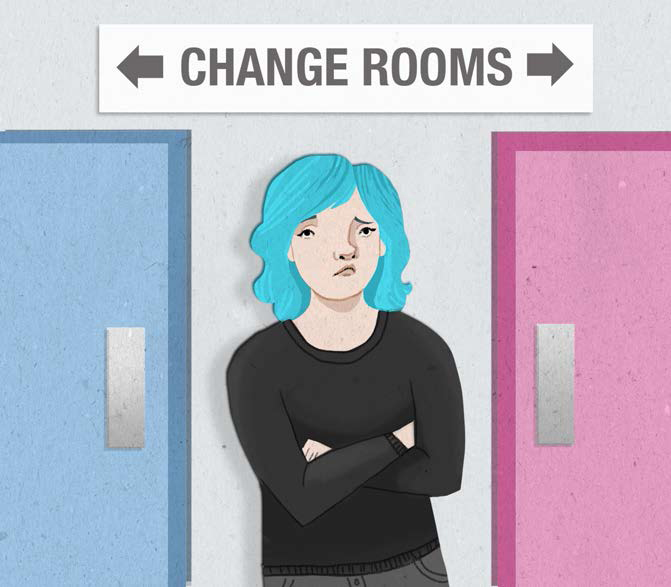
Change requires safe spaces
LGBTQ issues are in the spotlight at the University of Calgary and across the province. Workshops like “Trans 101” and “Asexuality 101” ran this week as part of an annual campus Sex Week, while Albertan high schools are currently working to implement new rules concerning student gender identity and expression. These conversations are important, but sometimes they need institutional support to get off the ground.
In the past few weeks, trans and non-binary students at the University of Calgary have come forward with their concerns over the lack of inclusive changing spaces in the kinesiology building. Trans non-binary student Quinn Nelson called for action in a Facebook post on Jan. 16.
“UCalgary students: If you want access to locker/change rooms on campus but can’t use them for various reasons (because you’re trans, disabled or anything else) and you want to lend your story or voice to this issue, please send me a private message,” the post said.
The creation of trans and non-binary inclusive spaces in the kinesiology building is likely happening because individuals who saw a problem with the way things were asked for change. They wrote letters and facebook statuses, contacted faculty and brought issues before boards and committees to iron things out. They saw a problem and felt like they could work to fix it at the U of C.
When it comes to issues like this, institutions are rarely inherently malicious or ill-willed. Rather, they just don’t realize these problems exist. While ignorance doesn’t excuse these issues, it does explain it.
These concerns call back to a similar discussion last year, when the U of C Students’ Union successfully put forward a proposal for the installation of gender-neutral washrooms in MacHall. That proposal was formally filed to university administration by then-SU vice-president student life Jonah Ardiel, but it involved extensive consultation with the Q Centre, individual students and other groups.
Since they formally opened, gender-neutral washrooms have created safe spaces for vulnerable individuals on campus. On a larger scale, the support they received in their creation from various institutions sends a message about what kind of campus this is.
The U of C is a place where everyone should feel comfortable and welcome. By actively pursuing this ideal, the SU and university
administration have created a community that at least claims the concerns of marginalized LGBTQ groups are valid and listened to.
It doesn’t matter whether that support comes from a place of genuine concern or not — this kind of institutional support is a foundation so concerned students can feel comfortable calling for change, even without the initial backing of a formal policy proposal.
It’s hard for members of marginalized groups to feel like their concerns are listened to without a precedent of support. And without individuals sharing their experience and pushing for change, it would be much harder to meet the needs of these groups.
The first step in encouraging these individuals to come forward is creating a welcoming and inclusive environment. Institution-supported initiatives like the gender-neutral washrooms and Bill 10 foster an environment where marginalized groups feel like they will be heard.
The creation of trans and non-binary inclusive change rooms in the kinesiology building would be another step towards creating a safe and comfortable campus for every student, faculty member and guest that walks through the doors of the U of C. Hopefully, it will inspire even more change in the future.
Melanie Woods, Gauntlet Editorial Board
